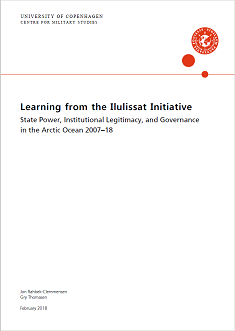Learning from the Ilulissat Initiative
In May 2018, ten years will have passed since the representatives from the five Arctic coastal states (Canada, Denmark, Norway, Russia) and the Home Rule government of Greenland met in Ilulissat. Learning from the Ilulissat Initiative examines how the initiative came about, and how it has affected the existing regional order in the Arctic.
Arctic diplomacy extends beyond the polar region
Arctic diplomacy is important because it enables practical solutions to regional issues and reduces the potential for great power conflict in the region.
Arctic institutions also have an impact that extends beyond the polar region, as they give Russia and Western diplomats an arena for communicating about broader non-Arctic questions, even as general East-West relations have grown strained since the Ukraine Crisis.
Regional diplomatic cooperation between the Arctic states has largely continued after the Russian annexation of Crimea in 2014, partly because Russia has strong economic interests in maintaining peaceful Arctic relations. Northern forums therefore give policymakers a rare opportunity to meet, communicate, and influence a key region.
Denmark’s diplomatic clout can be understood from the Ilulissat
The Ilulissat meeting was the result of a joint Danish‒Greenlandic initiative and is often hailed as one of the most prominent examples of successful Arctic diplomacy.
The Arctic Strategy of the Kingdom of Denmark is scheduled to be updated in 2018‒19. The report therefore aims to provide the basis for debate on Arctic governance and the future of the principles of the Ilulissat Declaration in the hope that it might contribute to these processes.
The report is written by Associate Professor, Dr. Jon Rahbek-Clemmensen, Royal Danish Defence College and Independent Consultant, Dr. Gry Thomasen.
Video presentation
Bibliography
Figures
Figure 2: The Reinforcing Cycle Between State Power and Legitimate Institutions
Figure 4: Annual Scientific Papers Using the Term Arctic Council in Google Scholar 1998-2016
Figure 5: Causes of the Waning Interest in an Arctic Treaty
Figure 6: The Central Arctic Ocean
Figure 7: Scenarios for Institutional Development in the Arctic
In the media
Danmark og Grønland værter for arktisk topmøde (Martin Breum, Arktisk Nyt, 12-02-2018)
Ny forskning: Sådan sikrede Danmark sin plads (Martin Breum, Information, 12-02-2018)
Orientering (Karen Hjulmand og Brita Kvist, P1, 20-02-2018)
Ilulissat Two: Why Greenland and Denmark are inviting Arctic governments back this May (Martin Breum, Arctic Today, 22-08-2018)

